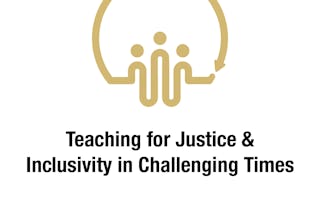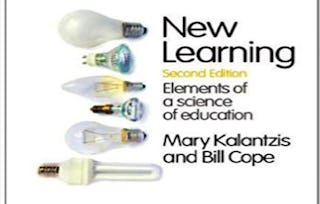Urban school reform in the United States is characterized by contentious, politicized debate. This course explores a set of critical issues in the education and educational reform space, with a focus on aspects of the field that have sparked controversy and polarized views. We will dig into these debates, situating them within the larger history of public education and school reform, and considering the viewpoints, the evidence, and translation of issues into educational policy.
Critical Issues in Urban Education

Critical Issues in Urban Education

Instructor: Sara Ray Stoelinga
12,118 already enrolled
Included with
75 reviews
Skills you'll gain
Details to know

Add to your LinkedIn profile
See how employees at top companies are mastering in-demand skills

There are 10 modules in this course
As we launch the course, we will explore the history of public schooling and school reform in the United States. The approach to public education in the United States is unique, with governance, quality, and approach residing at the state and local level. As a result, efforts to improve and reform public schools in the United States are complex. Together, we will unpack these critical foundational characteristics of American public schooling, and explore the ways in which these contextual factors influence topics explored throughout the course.
What's included
5 videos3 readings1 assignment1 discussion prompt
This week, we will examine federal strategies to improve public schooling, beginning with the No Child Left Behind Act (NCLB). NCLB is the 2001 reauthorization of the Elementary and Secondary Education Act. Enacted during the presidency of George W Bush, NCLB emphasized accountability, choice and flexibility. Discussion of the goals and intentions of NCLB will naturally lead us to consider the controversies around federal involvement in public education given the nature of the locally controlled approach to the American system. We will explore divergent opinions about NCLB theory of action and effectiveness.
What's included
6 videos5 readings1 assignment2 discussion prompts
As we continue our exploration of federal involvement in public education, we will discuss the Common Core State Standards (CCSS), the creation of a shared set of common standards and assessments for public education. We will examine the history of the creation of standards in the United States, revealing the fact that the concept of standards has been evident for decades. What can we learn from this history? How is the Common Core like or not like these previous efforts? We will consider the goals and intentions behind the Common Core, as well as the divergent opinions about its effectiveness.
What's included
5 videos5 readings1 assignment2 discussion prompts
We had the pleasure of interviewing several experts in the education space from around Chicago and the Urban Education Institute. Listen as they discuss topics surrounding NCLB and CCSS. They will have a variety of perspectives from that of a researcher to a practitioner. Which do you identify with? Did any of the participants resonate with you?
What's included
7 videos4 discussion prompts
School choice includes a set of practices and policies that aim to provide new educational options for students, to improve individual, school and school system outcomes. The concept on the surface sounds simple and logical and yet school choice is complex in implementation and has sparked much debate. What are the reasons for this controversy? Together, we will examine the history, types of school choice, the debates about effectiveness, and the ways in which this theory of action has become highly politicized and controversial.
What's included
5 videos3 readings1 assignment2 discussion prompts
This week, we will focus our attention on charter schools. We will explore the history of charter schools in the United States, examining fundamental questions about their theory of action and effectiveness. In these lectures, we will gain critical knowledge about how charter schools came to be, whether they are effective, and why they are so controversial.
What's included
5 videos4 readings1 assignment2 discussion prompts
We had the pleasure of interviewing several experts in the education space from around Chicago and the Urban Education Institute. Listen as they discuss issues surrounding School Choice and Charter Schools. They will have a variety of perspectives from that of a researcher to a practitioner. Which do you identify with? Did any of the participants resonate with you?
What's included
6 videos4 discussion prompts
The idea of accountability, or holding students, teachers, schools and school districts responsible for school performance, has become a key focus for practitioners, policy makers, and citizens. Why did the concept of accountability emerge and why has it become so central, so controversial? This week, we will learn about the concept of accountability in schools, which emerged in the United States in the 1990s. We will examine the history of the accountability, and the many forms this idea has taken. In doing so, we will consider pressing questions about how we ensure high quality schooling while not making accountability an ends in itself.
What's included
5 videos4 readings1 assignment2 discussion prompts
This week, we will dig more deeply into the concept of accountability, by examining teacher effectiveness and evaluation. In the process, we will learn about efforts to define and measure teacher effectiveness, and the push nationally to integrate teacher evaluation into individual teacher, school, school system and state accountability systems.
What's included
4 videos5 readings1 assignment2 discussion prompts
In the last week, we interviewed several experts in the education space from around Chicago and the Urban Education Institute on their view of accountability. As a summary of your learning in this class, we ask you to write a short response paper.
What's included
4 videos2 readings1 peer review2 discussion prompts
Instructor

Offered by
Explore more from Education
 Status: Preview
Status: PreviewUniversity of Illinois Urbana-Champaign
 Status: Preview
Status: PreviewUniversity of Colorado Boulder
 Status: Preview
Status: PreviewUniversity of Illinois Urbana-Champaign
 Status: Preview
Status: PreviewO.P. Jindal Global University
Why people choose Coursera for their career

Felipe M.

Jennifer J.

Larry W.

Chaitanya A.
Learner reviews
- 5 stars
80%
- 4 stars
14.66%
- 3 stars
1.33%
- 2 stars
0%
- 1 star
4%
Showing 3 of 75
Reviewed on Oct 23, 2019
Excellent course to get the foundations and history of U.S. public education
Reviewed on Mar 20, 2018
Very informative and entertaining. Learning the true requirements that makes up the no child left behind reauthorization is ver
Reviewed on Jan 26, 2019
Help a lot, got to learn a lot from this course. As I am student-teacher, this course is really helpful to reflect upon the concerns and issues in the education.

Open new doors with Coursera Plus
Unlimited access to 10,000+ world-class courses, hands-on projects, and job-ready certificate programs - all included in your subscription
Advance your career with an online degree
Earn a degree from world-class universities - 100% online
Join over 3,400 global companies that choose Coursera for Business
Upskill your employees to excel in the digital economy
Frequently asked questions
To access the course materials, assignments and to earn a Certificate, you will need to purchase the Certificate experience when you enroll in a course. You can try a Free Trial instead, or apply for Financial Aid. The course may offer 'Full Course, No Certificate' instead. This option lets you see all course materials, submit required assessments, and get a final grade. This also means that you will not be able to purchase a Certificate experience.
When you purchase a Certificate you get access to all course materials, including graded assignments. Upon completing the course, your electronic Certificate will be added to your Accomplishments page - from there, you can print your Certificate or add it to your LinkedIn profile.
Yes. In select learning programs, you can apply for financial aid or a scholarship if you can’t afford the enrollment fee. If fin aid or scholarship is available for your learning program selection, you’ll find a link to apply on the description page.
More questions
Financial aid available,
¹ Some assignments in this course are AI-graded. For these assignments, your data will be used in accordance with Coursera's Privacy Notice.